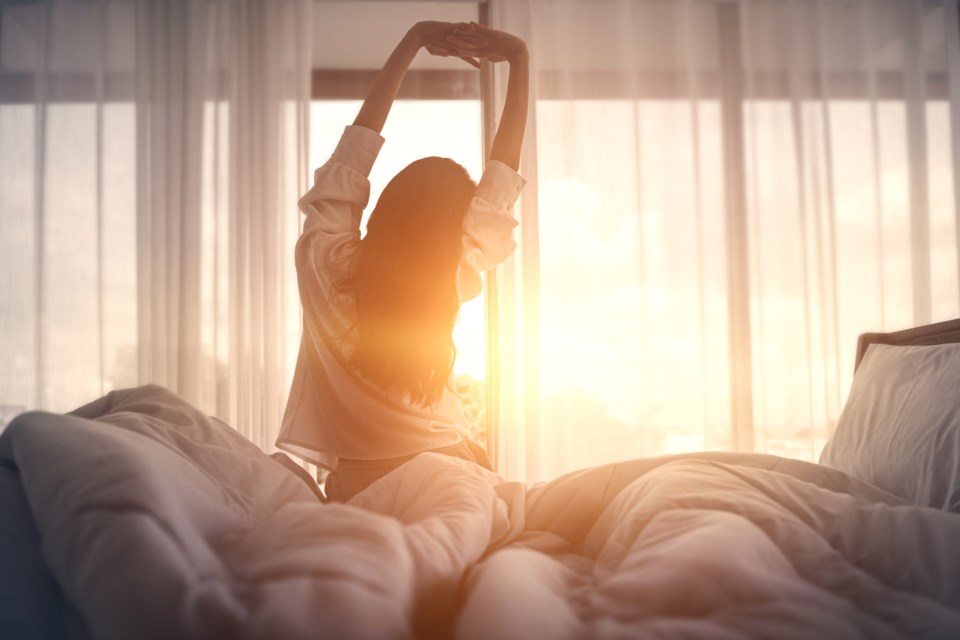Go to bed as early as possible, wake up as early as possible. Work from 8 a.m. until 5 p.m.
No caffeine within six hours (actually, 10 hours) of your bedtime. Work out at some point, but not late enough to spike your energy levels before bed. No screens for one hour before going to sleep. Get between seven and nine, but ideally eight, hours of sleep. Go to bed and wake up at the same time, every day of the week. Sleeping in is for slackers and is only acceptable once in a while, preferably on the rainiest of Sundays. If you struggle with the whole falling-asleep part of going to bed, add some magnesium and/or melatonin supplements into your night-time routine.
Striving to live by these practices has pretty much equated to being a well-rested, productive, successfully functioning human since at least the dawn of the internet. After all, most of the world centres around this schedule.
People whose sleep habits haven’t necessarily thrived with this schedule are often met with the simple advice to change them. Go to bed earlier, or cut out caffeine earlier—basically, be more disciplined.
All of the above-mentioned sleep tips are frequently cited with good intentions, for good reason. Obviously, it doesn’t require a PhD to know how important it is to sleep well on a regular basis. With sleep being the foundation for everything from a well-functioning immune system to the mental clarity needed to get through your day, its importance can’t be overstated.
But is there really a best time to go to sleep and to wake up? (Biologically, that is, not according to what society has decided is most responsible.) Some researchers investigating why we sleep when we do have found that while circadian rhythms can be adjusted, our internal clocks might not be entirely based on our habits, but in part on our genetics.
Sleep specialist Dr. Michael J. Breus dedicated an entire book to the topic, The Power of When. According to him, there are four main chronotypes, or inherent predispositions to feel tired at a particular time of day—and it’s not just early birds and night owls anymore, apparently. Instead, Breus stuck with mammals for the analogy: there’s early-risers (lions) late-nighters (wolves), in-betweeners (bears) and problem sleepers who likely need a little help (dolphins). But more than just your sleep habits, your individual chronotypes can also influence the times of day you’re hungriest, most alert and most active.
Breus argues that understanding your chronotype and adjusting your daily habits to capitalize on the periods when you’re functioning best will make your days flow better and make life less of a struggle, overall. Some research also shows that fighting our individual chronotypes could have negative effects on our health.
Though everyone’s individual sleep rhythm is likely to shift over the years, and yes, it’s generally possible for people who aren’t suffering from debilitating sleep disorders to adjust their sleep schedules to fit their lifestyle, maybe the secret to getting good sleep isn’t necessarily being more disciplined or regimented. Maybe it’s working with our natural tendencies instead of fighting them to optimize not just our sleep, but our waking hours.
I generally struggle with going to bed early. Mostly because evenings are when I find it easiest to be productive, but even trying to fall asleep before 11 is a challenge. As for mornings? The amount of days I fully fell asleep in a brightly-lit lecture hall during my 9 a.m. university law class, even after a solid seven hours of sleep, easily outnumbered the days I managed to stay awake, to give you an idea. I’m gonna guess I’m stuck somewhere between a wolf and a bear, if we’re going with Breus’ classifications.
Still, I’m experimenting with becoming a morning person, but to say waking up early feels natural to me would be a reach. Those experiments usually include scheduling 6 or 7 a.m. workouts, booking the earliest available appointments, setting a series of aggressive alarms and agreeing to early-morning plans with friends, all in an effort to bully myself into ignoring the all-too-dangerous snooze button. Through these experiments, I’ve learned getting out of bed will always suck at least a little, but being awake extra-early is a weirdly peaceful mood-booster (only once I’m past the point of falling back asleep).
Even with those measures, it typically takes a while to get my brain warmed up enough to form a coherent sentence. To actually settle into a semi-focused flow-state and start crossing tasks off a to-do list takes… a little while longer. Like, until what most people would consider an acceptable time to eat lunch.
With that in mind, I’m also doing my best to embrace my usual late-afternoon/early evening spurts of productivity and not feel too guilty on the days where the snooze button wins.
Maybe there is something to be said for adjusting your schedule to fit your chronotype, but I still haven’t completely given up on my somewhat delusional aspirations of becoming a morning person. Mostly because I don’t know when the next powder day is going to hit, and no one wants to be caught at the back of the line because of the snooze button.




